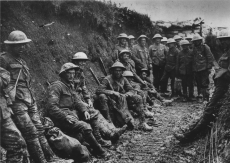
Wilfred Owen was perhaps the greatest of the First World War poets, a group of men who attempted to capture what war was like with all its tragedy, devastation and complexity, and one of his greatest poems is arguably Futility. At two stanzas long, with only seven lines in each stanza, it is one of Owen’s shorter poems, but it is none the worse for it. In fact, in terms of the size of the subjects it tries to grapple with, such as life and death, it is a very large poem indeed.
Its first line is an imperative: “Move him into the sun -”. This is almost certainly an order the narrator is recalling from an officer in the trenches and it does an effective job of grabbing the reader’s attention from the first. It seems in this initial command that a soldier has fallen unconscious and this is confirmed by the next part, “Gently its touch awoke him once, / At home, whispering of fields unsown. / Always it awoke him, even in France”. In delving into the unconscious soldier’s past relationship with the sun, it waking him from sleep every day of his life, the narrator reveals that the officer orders for the unconscious soldier to be placed directly in the light of the sun in the hope that it might wake him up. Personifying the star at the centre of our solar system, the narrator affirms at the end of the first stanza, “If anything might rouse him now/ The kind old sun will know.” The sun is presented here as an important ally in the midst of the blood, sweat and tears of war.
The narrator then reflects on the life-giving power of the sun, saying, “Think how it wakes the seeds - / Woke, once, the clays of a cold star.” In going from an object as small as a seed to an object as large as a star, Owen emphasises just how far reaching the sun’s power is. This then prompts the narrator to ask a challenging question, “Are limbs so dear-achieved, are sides / Full-nerved, still warm, - too hard to stir?” The rhetorical question challenges the power of sun, saying that if it can give life to a seed and a star, then why can’t it give life to a man on the edge of freezing (“too hard to stir”) to death? Its use of the word “dear-achieved” in regard to the human body is also interesting here, in that it attempts to express just how much effort, both physical, economic and emotional, has gone into growing this one man; from birth, to adolescence, to maturity. It is perhaps Owen’s way of emphasising how tragic it is that the labour placed into so many young men will be wasted due to their dying in war.
This sense of the overwhelming futility of war then comes to a head in the poems final lines, “O what made fatuous sunbeams toil / To break earth’s sleep at all?” This last rhetorical question ends the poem on a thoroughly pessimistic note. In light of the all-consuming destruction of war and the death the narrator sees all around him, the life-giving power of the sun is made to seem “fatuous”. What was the point of the sun’s awakening of life on this earth if this is what has resulted from it?
With its anger and frustration at the monumental wasting of human life in war and its negation of all the effort which has gone into shaping that life, Futility is an exceptionally powerful poem, in spite of its brevity and a prime example of why Wilfred Owen is often considered one of the greatest poets of the First World War.
Image: By Royal Engineers No 1 Printing Company. [Public domain], via Wikimedia Commons

0 Comment:
Be the first one to comment on this article.